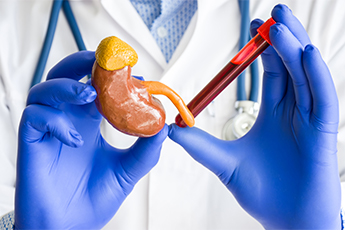Top signs that kidney cancer has spread

Kidney cancer (also known as renal cell carcinoma, or RCC) can spread outside of the kidney to other parts of your body. Metastatic cancer, as it’s known, may happen months or even years after cancer treatment ends and you have no signs of disease (remission). Metastatic kidney cancer is usually more challenging to treat than the initial cancer.

How common is metastatic kidney cancer?
Kidney cancer symptoms are difficult to detect when the disease first develops. For this reason, up to 20% of people with RCC learn that kidney cancer has already spread at the time they receive a diagnosis. An estimated 20% to 40% of people who undergo kidney surgery (nephrectomy) to treat kidney cancer later develop metastatic kidney cancer.
How does kidney cancer metastasize or spread?
For unknown reasons, cells that cause kidney cancer may break free from the original tumor. These cancerous cells can enter your bloodstream or lymphatic system (the blood’s filter system). Free-floating cancer cells may then settle in bones, organs, and lymph nodes, where they form new tumors.
It’s rare for kidney cancer to spread from one kidney to the other. Instead, kidney cancer typically spreads to:
bones
brain
liver
lungs
lymph nodes
If kidney cancer metastasizes, does that mean I have a new type of cancer?
When kidney cancer spreads, it causes a secondary cancer. However, the cancer is still referred to - and treated as - kidney cancer. For example, you don’t have bone cancer when kidney cancer cells settle in bones. Instead, you have metastasized kidney cancer in the bones or bone metastases (bone mets).
Treatment for bone cancer is significantly different from kidney cancer treatments, which is why this distinction is so important. Regardless of where the secondary cancer forms, your treatments will focus on kidney cancer.
How is metastatic kidney cancer staged?
To determine whether kidney cancer affects other parts of your body, you may undergo:
bone scans
computed tomography (CT) scans
magnetic resonance imaging (MRI) scans
X-rays
What is the staging system for metastatic kidney cancer?
Doctors use the TNM (tumor, node, metastasis) staging system to gauge the spread of kidney cancer. Staging happens at the initial diagnosis, and again if cancer returns.
Tumor growth: Your doctor measures the tumor size and sees if the cancer is localized to one section of a kidney, an entire kidney, or both kidneys.
Lymph node involvement: Your doctor looks for cancer cells in lymph nodes and determines the number of affected nodes.
Metastasis: Your doctor assesses if cancer has spread outside of the kidney to bones, lymph nodes, or other organs.
What are the stages of kidney cancer?
Lymph node involvement: Your doctor looks for cancer cells in lymph nodes and determines the number of affected nodes.
Metastasis: Your doctor assesses if cancer has spread outside of the kidney to bones, lymph nodes, or other organs.
What are the stages of kidney cancer?
Knowing the cancer type and stage helps your doctor choose the most effective kidney cancer treatment. The stage number changes if cancer spreads. There are four stages of kidney cancer:
Stage 1: The tumor is smaller than 2.75 inches (7 centimeters) and affects one kidney.
Stage 2: The tumor is larger than 2.75 inches (7 centimeters) and affects one kidney.
Stage 3: Cancer has spread to nearby lymph nodes, major veins, or tissue. It has not spread to other organs.
Stage 4: Cancer has spread into adrenal glands on the same side as the diseased kidney. It may also affect lymph nodes, but not other organs. Stage 4 kidney cancer also refers to cancer that has spread to bones or other organs.
What are the signs of metastatic kidney cancer?
Signs of metastatic kidney cancer vary depending on where the secondary cancer develops. Here’s a look at the top signs that kidney cancer is in your:
bones
brain
liver
lungs
lymph nodes
Metastatic kidney cancer in bones
Bone metastases (bone mets) typically affect the spine, but tumors can also appear in the hips, arms, legs, and skull. This form of secondary cancer increases your risk for potentially debilitating fractures and spinal nerve damage.
Top five signs of bone metastases (bone mets):
bone pain that gets worse when you rest and improves when you move
leg numbness or weakness
sudden back or neck pain
unexplained broken bones that cause severe pain
urine or fecal incontinence, or difficulty urinating
Metastatic kidney cancer in the brain
A retrospective analysis of nearly 70 clinical trials presented at the 2018 International Kidney Cancer Symposium found that approximately 1 in 20 people with metastatic RCC have brain metastases (brain mets) when first diagnosed with kidney cancer. These brain mets often go undetected at the time of the initial diagnosis because the tumors rarely cause symptoms.
Top five signs of brain metastases (brain mets):
headaches
inability to move an arm or leg
mood or personality changes
speech, hearing, or swallowing problems
seizures
Metastatic kidney cancer in the liver
Top five signs of liver metastases (liver mets):
bloated belly
jaundice (yellow skin or eyes)
itchy skin
loss of appetite and weight loss
swollen legs
From the community: “My heart is breaking because my husband has been diagnosed, out of the blue with what we thought was a cough due to allergies, with kidney cancer that has spread to the lungs with mets too 'numerous to count’… Larger tumor on the right kidney, with lymph node beside the kidney affected and lots of lung mets. He just began Sutent 11 days ago. Thankfully the Cleveland oncologist called it accurately as clear cell (we have had a biopsy) and ordered the treatment on Aug 1 which arrived 2 weeks later. So, here we are. How is everyone doing with Sutent? Good things? Bad things? Miracle stories? I am very aware of the worst thing that can happen, but are there successes as well? I sure hope so. Any helpful hints or things to look out for?" - Inspire member
Metastatic kidney cancer in the lungs
Kidney cancer most commonly spreads to the lungs or bones.
Top five signs of lung metastases (lung mets):
coughing, especially coughing up blood or mucus
chest pain
loss of appetite and weight loss
shortness of breath
wheezing or discomfort while breathing
Metastatic kidney cancer in the lymph nodes
Cancer cells can travel to other parts of the body through the lymphatic system, a part of your body’s immune system. Lymph nodes are small glands that help your immune system filter harmful substances. You have hundreds of lymph nodes in your body. Kidney cancer typically spreads to lymph nodes closest to the diseased kidney.
Top five signs of lymph node metastases (lymph node mets):
swollen lymph nodes in the neck, armpits, or groin
fever
night sweats
chronic fatigue
itchy skin
From the community: “3 years ago I had partial kidney removal due to cancer. So far have been clear, but when doing a routine scans they found nodules on my left kidney, lung and two on my adrenal gland. That being said I’m scared and was wondering if anyone has gone through this themselves, and what was the outcome.” - Inspire member
Sources
Bone Metastases. American Cancer Society. September 2020.
Brain Metastases. American Cancer Society. September 2020.
If You Have Kidney Cancer. American Cancer Society. February 2020.
Kidney Cancer Stages. American Cancer Society. February 2020.
Liver Metastases. American Cancer Society. September 2020.
Lung Metastases. American Cancer Society. September 2020.
Lymph Nodes and Cancer. American Cancer Society. March 2020.
Kidney Cancer: Stages. American Society of Clinical Oncology. August 2019.
Treatments for Advanced Kidney Cancer. International Kidney Cancer Coalition.
Metastatic Renal Cell Carcinoma: Watch for Brain Mets. MedPage Today. November 2019.
Renal Cell Cancer Treatment (PDQ®) – Patient Version. National Cancer Institute. July 2020.
Fleckenstein, F. et al. Renal Cell Carcinoma Metastatic to the Liver: Early Response Assessment After Intraarterial Therapy Using 3D Quantitative Tumor Enhancement Analysis. Translational Oncology. October 2016.
What Is Kidney Cancer? Urology Care Foundation.
Disclaimer
Member comments are lightly edited for length and to remove identifying information but are otherwise reproduced as they appear in the community as part of public posts.
This content is for general informational purposes only and does not necessarily reflect the views and opinions of any organization or individual. The content should not be used as a substitute for professional medical advice, diagnosis, or treatment. Please consult your healthcare provider about any questions you may have regarding a medical condition.




